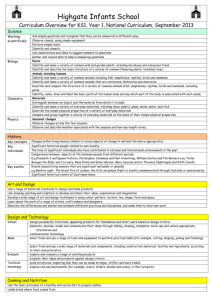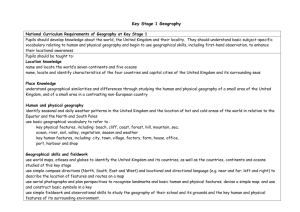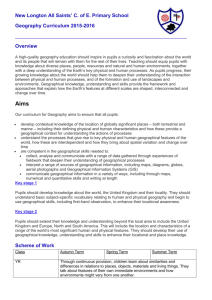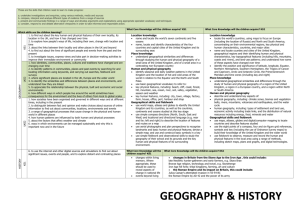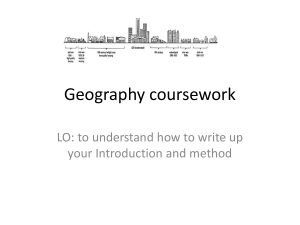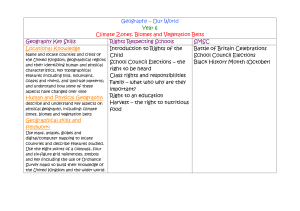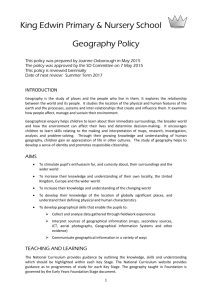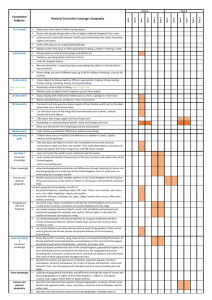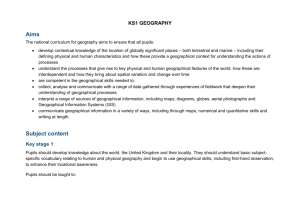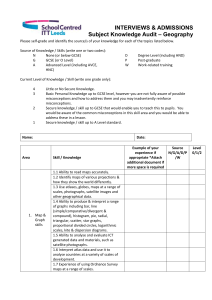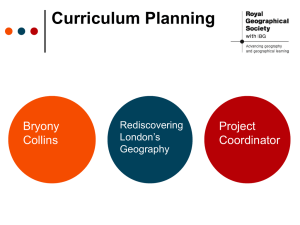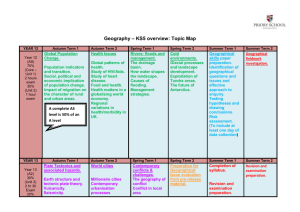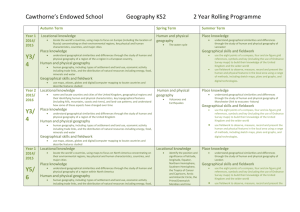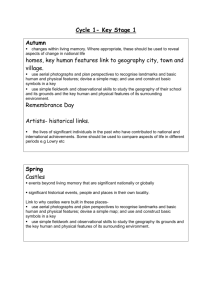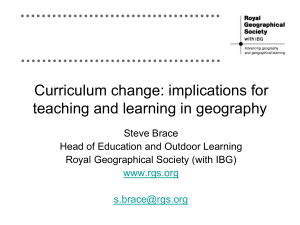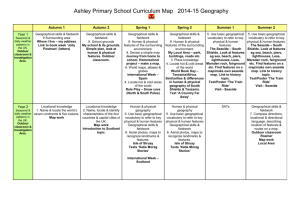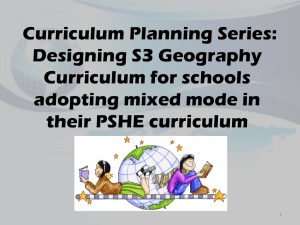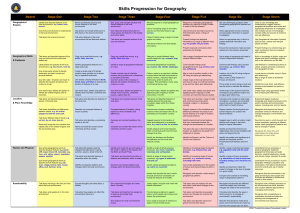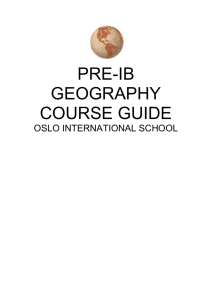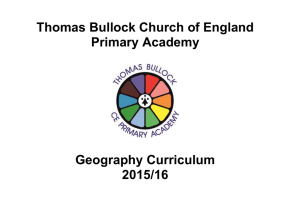Comparison table
advertisement
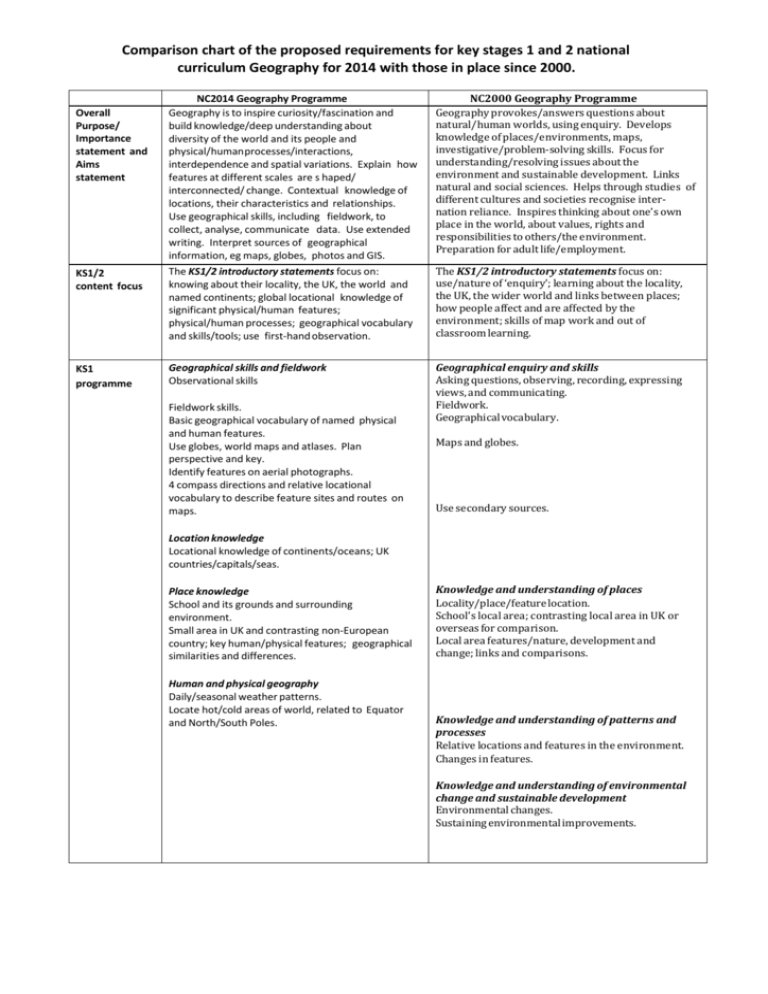
Comparison chart of the proposed requirements for key stages 1 and 2 national curriculum Geography for 2014 with those in place since 2000. NC2014 Geography Programme Geography is to inspire curiosity/fascination and build knowledge/deep understanding about diversity of the world and its people and physical/human processes/interactions, interdependence and spatial variations. Explain how features at different scales are s haped/ interconnected/ change. Contextual knowledge of locations, their characteristics and relationships. Use geographical skills, including fieldwork, to collect, analyse, communicate data. Use extended writing. Interpret sources of geographical information, eg maps, globes, photos and GIS. NC2000 Geography Programme Geography provokes/answers questions about natural/human worlds, using enquiry. Develops knowledge of places/environments, maps, investigative/problem-solving skills. Focus for understanding/resolving issues about the environment and sustainable development. Links natural and social sciences. Helps through studies of different cultures and societies recognise internation reliance. Inspires thinking about one’s own place in the world, about values, rights and responsibilities to others/the environment. Preparation for adult life/employment. KS1/2 content focus The KS1/2 introductory statements focus on: knowing about their locality, the UK, the world and named continents; global locational knowledge of significant physical/human features; physical/human processes; geographical vocabulary and skills/tools; use first-hand observation. The KS1/2 introductory statements focus on: use/nature of ‘enquiry’; learning about the locality, the UK, the wider world and links between places; how people affect and are affected by the environment; skills of map work and out of classroom learning. KS1 programme Geographical skills and fieldwork Observational skills Geographical enquiry and skills Asking questions, observing, recording, expressing views, and communicating. Fieldwork. Geographical vocabulary. Overall Purpose/ Importance statement and Aims statement Fieldwork skills. Basic geographical vocabulary of named physical and human features. Use globes, world maps and atlases. Plan perspective and key. Identify features on aerial photographs. 4 compass directions and relative locational vocabulary to describe feature sites and routes on maps. Maps and globes. Use secondary sources. Location knowledge Locational knowledge of continents/oceans; UK countries/capitals/seas. Place knowledge School and its grounds and surrounding environment. Small area in UK and contrasting non-European country; key human/physical features; geographical similarities and differences. Human and physical geography Daily/seasonal weather patterns. Locate hot/cold areas of world, related to Equator and North/South Poles. Knowledge and understanding of places Locality/place/feature location. School’s local area; contrasting local area in UK or overseas for comparison. Local area features/nature, development and change; links and comparisons. Knowledge and understanding of patterns and processes Relative locations and features in the environment. Changes in features. Knowledge and understanding of environmental change and sustainable development Environmental changes. Sustaining environmental improvements. KS2 programme Geographical skills and fieldwork Use fieldwork to observe/measure/record physical/human features in local area, using range of methods. Local area fieldwork methods, using sketch maps, plans, graphs digital technologies. Maps, atlases, globes, digital/computer mapping for location and feature description. Map symbols/key, 8 compass points, 4- & 6- figure grid references. OS maps (and other maps) to build UK/world knowledge. Location knowledge Locational knowledge of world’s countries. Locational knowledge of environmental regions, physical/human characteristics and major cities of Europe, and North and South America. UK countries, cities, topographical features, land use and characteristics of regions, including how some aspects changed over time. Position/significance of latitude/longitude, Equator, Tropics of Cancer/Capricorn, Arctic/Antarctic Circles, Northern/ Southern Hemispheres, prime meridian, time zones. Place knowledge Physical/human geography of a region of UK, of a European country, and within North or South American to understand geographical similarities/differences. Geographical enquiry and skills Asking questions, collecting/recording/analysing evidence; explaining varied view, communicating. Fieldwork methods/techniques. ICT in investigations. Develop vocabulary. Maps, atlases and globes. Secondary sources. Decision making. Knowledge and understanding of places Locations of significant British Isles, European and world places/features. Locality/place location. Study locality in UK and less economically developed country, for comparison. Locality features/nature/activities; why/how of change up to now/for the future; geographical context and interdependence. Place comparisons. Knowledge and understanding of patterns and processes Patterns made by physical and human features. Physical and human processes; how these create changes to environments/places. At a range of scales and in a variety of environments/places. Water (river or coastal) processes and affects on people. Human and physical geography Key aspects of physical geography, including: climate zones; biomes, vegetation belts; rivers, water cycle; mountains, volcanoes/earthquakes. Ways settlements differ/change; their ‘characters’. Land use issues. Key aspects of human geography, including: settlements; land use; economic activity and trade; natural resource distribution including energy, food, minerals and water supplies. Knowledge and understanding of environmental change and sustainable development People damaging/improving environment; decisions affecting people’s lives. How/why people manage environments sustainably; opportunities for personal involvement. An environmental issue arising from change.
